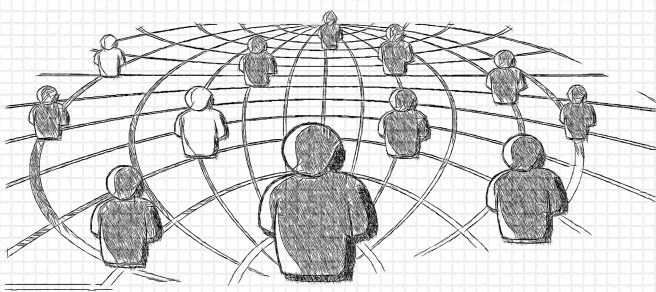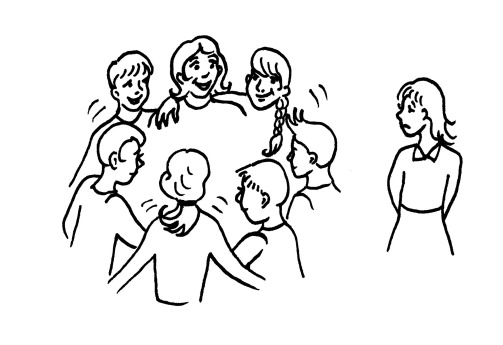I was recently involved in a presentation about loneliness to a group of elders living in an assisted living community. My role was to facilitate a discussion with the elders. I was asking them for their thoughts on what “social connection” meant to them.
One woman, in her 90s, listened intently and offered this response [insert Eastern European accent]:
“[Sigh] I survived the war. I just want to lead a nice, quiet life.”
Fair enough.
There is a national conversation about loneliness and old people. It is an important conversation. But is it the “right” conversation?
According to a survey by AARP, older adults reported lower rates of loneliness than those who were younger (43% of those age 45-49 were lonely compared to 25% of those 70+). This is supported by academic research, which has similarly found that older people are no more lonely than younger people.
The reality seems to be that loneliness is not an experience that is tied to age. Many of us are lonely. Not just old people.
This should not be interpreted to mean that we shouldn’t be concerned about older people feeling lonely. In terms of numbers, there are still a lot of older people who are lonely. But perhaps, just thinking of it as an “old person problem” is not going to actually help us resolve it, when loneliness might actually be more of a widespread social problem.
According to my own theory, Sonya’s Theory of Paradoxical Disconnection, loneliness is at least partly related to us being generally disconnected in our society, starting in our own neighborhoods and communities. The paradox is that we are also more connected than ever, through technology, globalization, and ease of travel.

I don’t think I am being pessimistic. In our current society, we operate under a culture of busyness. Most people don’t seem to have time to really connect with others. The paradox of busyness is that it does not necessarily lead to connection, which is something we need to consider in how we respond to loneliness (especially if we suggest that keeping busy is a way to alleviate loneliness). We seem to lack time and energy to develop relationships in our communities. Perhaps we spend time with our families or a close group of friends, yet we don’t know our neighbors. We tend to operate in our own little worlds. We are connected yet disconnected.
Because we are generally disconnected with each other, we are particularly disconnected with people of various generations. Especially older people.
This creates the potential for loneliness for all of us. Even more, it creates experiences of loneliness that might not be well understood. Because we do not know each other, we make assumptions about what it means to be old, to be young, to be….anything. Maybe because we are disconnected from each other generation-ally, we make assumptions about what loneliness means for older people.
We need to think differently about loneliness. Maybe even starting with what it actually means.
Consistent with my conversation with the elder I mentioned earlier, lots of times when I talk about loneliness to older people, I hear things like, “But I like to be alone! Let me be alone!”.
Oh, introvert. I feel you. I am an introvert too! I like to be alone. In fact, I NEED to be alone. However, being alone and loneliness are not the same things. Although, in every day language, we might use those terms interchangeably, loneliness has a specific meaning that is based in psychology.
Loneliness is defined as an unpleasant or distressing emotion that happens when we are dissatisfied with the quantity or quality of our relationships.
If a person is feeling lonely, they are, by definition, distressed about it.
However, if a person is alone, they might not be lonely. If a person is alone and not distressed about it, that could just be their preference.
We need to be careful that we are not making assumptions that older people are lonely just because they are alone.
 One of the challenges of loneliness is determining whether a person is actually lonely. We might make assumptions about how we think a person is feeling, but we might not actually know. If a person is feeling lonely, it is also important to not make assumptions about what would make a person feel less lonely. It might not be more people in their lives. It might be deeper connections. Or, it might not be deep connections at all. We need to find the right language to explore this with each other. One of the pathways we might use to do this is through talking together about social connections.
One of the challenges of loneliness is determining whether a person is actually lonely. We might make assumptions about how we think a person is feeling, but we might not actually know. If a person is feeling lonely, it is also important to not make assumptions about what would make a person feel less lonely. It might not be more people in their lives. It might be deeper connections. Or, it might not be deep connections at all. We need to find the right language to explore this with each other. One of the pathways we might use to do this is through talking together about social connections.
Research from a wide array of disciplines consistently supports that we are wired for human connection. Studies uncovering the factors that influence longevity almost always include the importance of relationships. We are social animals.
Yet, the type and amount of relationships we have and want varies by individual.
A person might be alone, and may or may not have social connections. And be okay with this.
A person who is feeling lonely might have social connections but does not have them in the way they would like.
It is true that, as people get older, there might be less opportunity for social connection. However, it is important to recognize that having less social connections does not necessarily mean people are lonely. It could. But it also could be possible that older people want fewer social connections. In fact, there are some theories in gerontology that say this is a part of the experience of growing older. That, for some people, they invest more heavily in fewer relationships, particularly ones that give them satisfaction. They might be less likely to invest in those that do not. As one elder recently told me, “I don’t need drama in my life at my age”.
That being said, one of the ways in which we currently seem to try to alleviate loneliness is by offering older people more opportunities to be social. However, these opportunities may or may not be personally meaningful to them. They might not be opportunities for deep connection.
These opportunities might offer the possibility that a person would connect with someone. Or perhaps the thinking is, “Well, if my mom goes to this exercise class it is better than her sitting at home”.
However, this might not actually be affecting a person’s feelings of loneliness. It might result in them being less alone. It might offer them social connections. But the person is still lonely. Maybe even more so. Because she does not feel she belongs in exercise class.
 We need to be mindful of our well-intentioned identification of “solutions” to older people’s loneliness that is based on what we think they need.
We need to be mindful of our well-intentioned identification of “solutions” to older people’s loneliness that is based on what we think they need.
This all raises more questions than answers. As Betty Friedan wisely said, “Sometimes you have to live in the question”.
What does it mean for a person to be socially connected?
How “should” an individual be socially connected? How many, and what type, of social connections “should” an older person have?
What if what someone wants, or doesn’t want, related to social connection, is not what she or he “should” do?
Is it “good” for a person to be alone?
What if someone lived through the war and just wants to lead a nice, quiet life?
Underlying all these questions are things that are bigger than loneliness and social connection. Things that we need to pay attention to, if we are to alleviate our loneliness. The first is possible underlying paternalism and ageism.

I need to point out that often the attempts to alleviate loneliness have been made by “us” to older people. Is this another form of paternalism? Are we forcing social interaction on people to help with their loneliness without involving them, or listening to what is important to them?
Is this also ageist, because we assume that older people are lonely, just because they are old? Is there an underlying ageist assumption that all older people are the same, and maybe even that they are limited in how they create social connections because of their age?
If our approaches are not considering the individual interests, needs, and feelings of a person who is lonely, then it could be paternalistic, ageist, and not person-centered to develop “solutions” that are driven by what we think older people should do, or what we think they need.
This also reflects dangerous thinking that older people cannot possibly contribute to society or others in any meaningful way,\. So, instead of seeing how they can meaningfully participate in community, let’s just offer them generalized social opportunities to “help” them be less lonely.
This ageist and paternalistic thinking also denies us the possibility of elders themselves being a key to alleviating loneliness in other generations. Having elders foster connections for us all.
Which brings me to purpose.

I find that this is often missing from conversations about loneliness. Certainly they are somewhat related. If you do not feel that you have purpose, that must be very lonely. Also, if you are introduced to opportunities for social connection that lack purpose in ways that are personally relevant to you, would you invest in them? Try them? Would they really impact your loneliness? They might even make you feel more lonely, because you might find yourself in social situations and with social connections to which you do not feel you belong, and you are not sure the point of it.
 And then it always comes back to person-centeredness. If we are to address loneliness, we need to be person-centered about it. To try to see things from a person’s perspective, and understand if she or he is lonely, what social connection means to him or her, what is important to him or her. See the person. Perhaps consider that we are facilitating opportunities for purpose and connection, rather than driving solutions for older people.
And then it always comes back to person-centeredness. If we are to address loneliness, we need to be person-centered about it. To try to see things from a person’s perspective, and understand if she or he is lonely, what social connection means to him or her, what is important to him or her. See the person. Perhaps consider that we are facilitating opportunities for purpose and connection, rather than driving solutions for older people.
The reasons why a person feels lonely could be related to many things like personality, stigma, depression, anxiety, medical conditions, transportation, and cognitive changes. It is important to understand this. For example, if a person is living with dementia, and we sense that this person is lonely, we might encourage this person to join a large group of people who are playing cards. The group might be too big for the person to comfortably navigate with their cognitive changes. It might be too noisy. The game might be too complicated. The person with dementia might be embarrassed. She might then feel even more lonely. She might retreat even more. Another person with dementia might love this group. It might make her feel energized.
As we understand the individual experience of loneliness, we can then help create, with the person, ways for them to possibly feel less lonely, in ways that are personally meaningful to him or her.
Loneliness is complex. Perhaps in our conversations about loneliness, as we explore it further, we can consider these ideas:
- Loneliness is not just an “old person” problem. People of all ages are lonely.
- Loneliness is a distressing emotion. It is different than being alone.
- Feelings of loneliness are related to lack of social connection, in the quantity and quality of social connections.
- One of the possible reasons for explaining pervasive loneliness across ages might be a disconnected society.
- Antidotes to loneliness amongst older people are not necessarily having more social connections, or offering more social opportunities.
- Antidotes to loneliness need to include what loneliness means to the individual, resisting ageist and paternalistic assumptions about older people, and the importance of purpose.
The problem of loneliness is not just about older people. It is about all of us. As loneliness is a problem, it is also an opportunity. For us to think more broadly about our disconnection and how we can create connections amongst us, in ways that are personally meaningful to each of us
Perhaps we can approach this from a person-centered lens, and try to understand what a person wants, what is important to him or her, what gives him or her purpose, how a person can feel more connected in our society overall, and how we can ensure that older people are seen and heard.

This is wonderful, Sonya! Your points about loneliness are right on. This needs to be read by everyone!
LikeLike
Thank you! Feel free to share!
LikeLiked by 1 person
Share it on LinkedIn.
LikeLiked by 1 person
Thanks, as always for your insight and contribution to challenging ageism and promoting aging as something not to be feared.
LikeLiked by 1 person